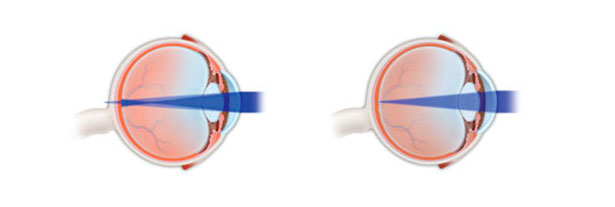Astigmatism is an eye condition that can cause blurred or distorted vision. With more than 3 million cases of astigmatism diagnosed each year, it is one of the most common eye conditions1 in the United States today. In most cases, astigmatism is a minor condition that can be easily treated through eyeglasses, contact lenses, or surgery.
In order to understand how astigmatism distorts vision, it is helpful to understand how the shape of the cornea affects vision. The cornea is the clear front part of the eye that covers the iris and pupil. It works with the anterior chamber and lens to refract (bend) light as it enters the eye and is responsible for roughly 65% of the eye's optical power.
As light enters a normal eye, it refracts evenly, creating a clear view of objects in the visual field. In people with astigmatism2, the cornea has an irregular curvature, more like that of a football. This causes the light to be refracted unevenly as it enters the eye, causing only a portion of the object to be in focus at one time, resulting in some degree of blurriness or distortion at any viewing distance (near, far, or in between).
In reality, very few people have perfectly spherical eyes, meaning that most people have some degree of astigmatism. Minor astigmatism does not typically affect vision and therefore does not require treatment; however, higher levels of astigmatism can cause symptoms3 and visual disturbances that require treatment to correct.
Because astigmatism affects how the eyes bend light, it often occurs alongside other vision conditions such as myopia (nearsightedness) and hyperopia (farsightedness). Collectively, this set of conditions is referred to as refractive errors.

In a normal eye, the cornea and lens focus light rays on the retina.
In astigmatism, images focus in front of and beyond the retina, causing both close and distant objects to appear blurry.
Astigmatism is not a disease or disorder. It simply refers to a variation in the shape of the cornea. The exact cause astigmatism has not been determined, but it can be a hereditary condition. If one or both of your parents have astigmatism, you likely will too. It is usually present from birth and may worsen or improve over time.
Less frequently, an individual may develop astigmatism after an eye injury, disease, or surgery. In these instances, it is common to see larger degrees of astigmatism.
Symptoms of astigmatism include:
Astigmatism can be diagnosed through a comprehensive eye examination performed by one of our ophthalmologists. During the exam, your eye doctor may perform any of the following diagnostic tests:
Once the appropriate tests are complete, we can determine whether you have astigmatism and recommend a treatment to correct your vision, if required.
If the astigmatism is minor and there are no other visual problems, then treatment may not be necessary. When treatment is needed to improve vision or relieve eye discomfort, eyeglasses or contact lens are the most commonly prescribed treatment option. The lenses required to correct astigmatism are called toric lenses. These can be incorporated into eyeglasses or special soft or gas-permeable rigid toric contact lenses can be used.
Some forms of astigmatism can also be corrected through refractive or laser eye surgery. During this procedure, the surgeon reshapes the cornea to improve the way that light refracts as it enters the eyes. Refractive surgery can only be performed on individuals who have otherwise healthy eyes that are free from eye disease, retinal problems, and corneal scarring.
While some people require no treatment for their astigmatism, others have astigmatism that worsens with time. As such, it's important to attend regular eye exams so your doctor can ensure that proper vision is maintained.
The eye doctors at Beach Eye Medical Group are experts at correcting all degrees of astigmatism and offer the latest, most effective treatments available today. We utilize advanced technology to detect and treat astigmatism, ensuring that you always experience optimal vision and eye health. Please contact us today to learn more about how we can help care for your eyes.
Our ophthalmologists are also experts at refractive surgery and work with a skilled team of nurses and anesthesiologists to provide our patients with the best results. If you are considering refractive surgery to correct astigmatism, we encourage you to schedule a consultation with us to learn more.
References
1 What is astigmatism? Available: https://www.nhs.uk/conditions/astigmatism/
2 Astigmatism. Available: https://www.mayoclinic.org/diseases-conditions/astigmatism/symptoms-causes/syc-20353835
3 What Is Astigmatism? Symptoms, Causes, Diagnosis, Treatment Available: https://www.aao.org/eye-health/diseases/what-is-astigmatism
I love Dr. Liu. She is amazing and so easy to talk to. Her expertise is at the highest level! The entire practice of professionals is wonderful!